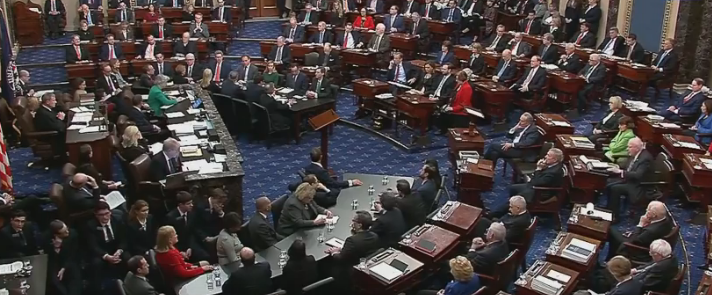
- Details
- By Levi Rickert
WASHINGTON — The United States Senate voted today to acquit President Donald Trump on the House of Representatives’ two articles of impeachment on Wednesday.
The Senate, with the Republican majority, voted mostly along partisan lines, with the exception of Sen. Mitt Romney (R-Utah). Romney, a former presidential candidate voted to guilty on the first article of impeachment, which accused Trump of abuse of power in his dealings with Ukraine. The final vote was 52-48 to acquit on the first article of impeachment.
On the second article of impeachment, which accused Trump of obstruction of Congress, Romney voted not guilty. The final vote to acquit on the second article of impeachment by a vote of 53-47.
The vote to convict would have required two-third majority of the Senate.
Romney said in speech before his Senate colleagues that his decision to vote to convict was the “most difficult decision I have ever faced.”
The Senate acquittal ends the three-week long impeachment trial. While the Senate acquittal allows the president to remain in office, the impeachment by the House of Representatives will forever remain on his record.
Trump is the third president of the United States to have been impeached. None have been removed from office.
More Stories Like This
Native News Weekly (August 25, 2024): D.C. BriefsNavajo Nation Mourns the Passing of Former Vice President Rex Lee Jim
Deb Haaland Earns Endorsement From Communications Workers of America Local 7076
University Soccer Standout Leads by Example
Two Native Americans Named to Democratic Congressional Campaign Committee's“Red to Blue” Program
Help us defend tribal sovereignty.
At Native News Online, our mission is rooted in telling the stories that strengthen sovereignty and uplift Indigenous voices — not just at year’s end, but every single day.
Because of your generosity last year, we were able to keep our reporters on the ground in tribal communities, at national gatherings and in the halls of Congress — covering the issues that matter most to Indian Country: sovereignty, culture, education, health and economic opportunity.
That support sustained us through a tough year in 2025. Now, as we look to the year ahead, we need your help right now to ensure warrior journalism remains strong — reporting that defends tribal sovereignty, amplifies Native truth, and holds power accountable.
 The stakes couldn't be higher. Your support keeps Native voices heard, Native stories told and Native sovereignty defended.
The stakes couldn't be higher. Your support keeps Native voices heard, Native stories told and Native sovereignty defended.
Stand with Warrior Journalism today.
Levi Rickert (Potawatomi), Editor & Publisher

